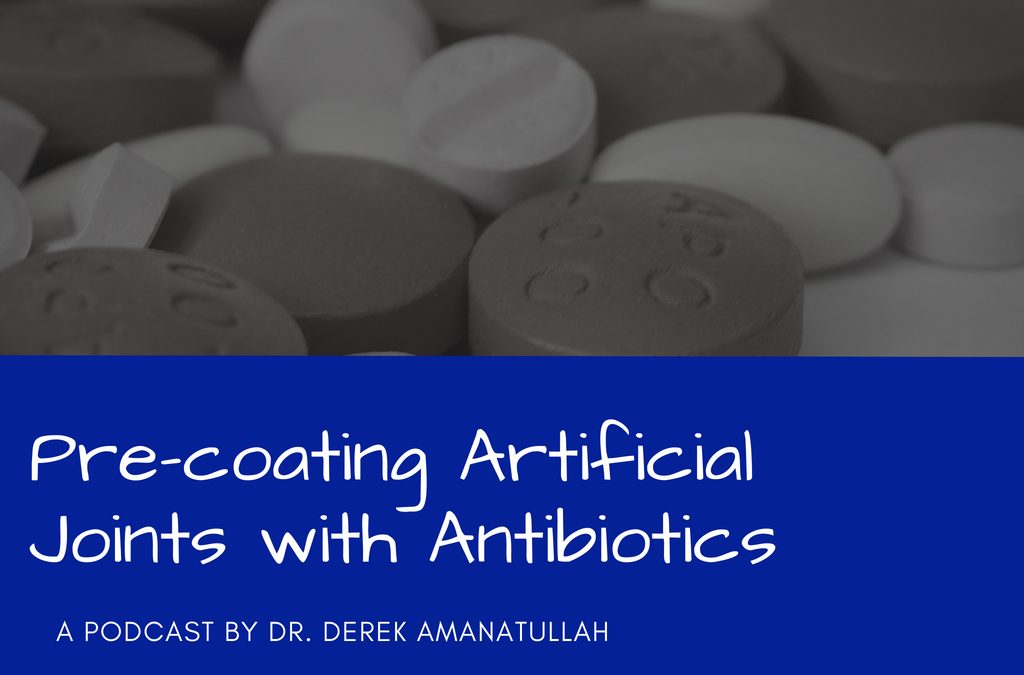Interviewer: Hello and welcome Dr. Amanatullah! How are you doing this afternoon?
Dr. Amanatullah: I’m doing great, thank you!
Interviewer: Perfect. Well, I’m very excited for this month’s topic as it seems to be something that’s on the mind of a lot of individuals in your field and I’m particularly interested in hearing your thoughts so let’s jump right in. A recent conference had orthopedic surgeons everywhere discussing antibiotics, and specifically, they were weighing the rewards of pre-coating artificial joints in antibiotics vs. the cost and potential benefit. Can you explain a little bit of the reasoning behind what pre-coating artificial joints with antibiotics would do?
Dr. Amanatullah: Yeah so, what we’re very interested in — and I was at that meeting — what we’re very interested in is how to prevent an infection. And most people would say, “Well, the best way to prevent an infection is just to clean everything.” It turns out that that’s harder than you might think. Meaning bacteria have been around for millennia and their job is to survive on asteroids and hot vents and all over, on your body, all over the place that are not hospitable to the bacteria. And we can make it really inhospitable by cleaning it with alcohol, cleaning with iodine, sterilizing things in a high-pressure, hot sterilization oven basically. But even all those things don’t necessarily get rid of everything. If they got rid of everything, the second we touch the skin, even with a scalpel, even if we’ve cleaned your skin, the skin sweats and it can release even more bacteria. And that bacteria ultimately probably gets somewhere around the wound at some time and in some individuals could cause an infection, so we’ve all wondered if delivering antibiotics before surgery could help.
Interviewer: Okay
Dr. Amanatullah: So at the consensus meeting we talked about delivering antibiotics a few ways which would be coating implants; the other way would be delivering antibiotics that would elute out of cement that’s used in joint replacements. Or even sometimes applying long-term antibiotics to the patients to try and suppress or prevent an infection.
Interviewer: How, How prevalent are these infections that these processes would try and prevent?
Dr. Amanatullah: Yeah, so they — it depends — the answer is it depends on the patient meaning in a normal, healthy individual, they’re very very very very rare. In a patient who gets sick, so a patient who has many medical comorbidities — heart disease, diabetes, obesity, you know, maybe a prior heart attack — their, what you have to imagine is their immune system is weaker than that other healthy individual regardless of the types of medical comorbidities, and different medical comorbidities vary based on how much they affect the immune system. Meaning, let’s say you had a heart transplant and wanted a knee replacement then your risk is also additionally high because the immune system is affected. In those patients, it can be quite common. It can be as high as 10% in some patient populations like liver failure. So, we want to be very cognizant of who the patient is, but yet if we’re gonna use it in those patients, we also want to try and suppress it as much as possible in any of the patients. But it’s the high-risk patients that we’re most concerned about and where we should consider utilizing antibiotics, which is our, kind of our current only therapeutic agent for preventing infection right now.
Interviewer: K, and that’s understandable. Are there…are there any risks or downfalls to engaging in precoating with antibiotics?
Dr. Amanatullah: Yeah so, we are very concerned about antibiotic resistance. So any delivery mechanism we’re going to be concerned about the fact that the bacteria mutate and change and can acquire genes that can make them resistant to the antibiotics so that’s number one. Specifically, with coating the implants, we really worry about two major things. One is that by coating the implants with a certain antibiotic it makes it easier for another bacteria that’s not sensitive to that antibiotic to attack that implant. Meaning if I use an antibiotic say for staph, then maybe we get a lot more e-coli infections because those are hanging around and now they’re allowed to grow. The last one would be that the implants sometimes need the bone to interact with it, meaning the bone needs to grow into the implant and if the elution of the antibiotic affected bony ingrowth that could be a bad thing. We don’t want to compromise fixation for preventing what should be a relatively rare side effect.
Interviewer: And that makes sense. Are there other ways to detect and prevent the onset of these potentially rare infections without precoating the joint in antibiotics?
Dr. Amanatullah: Yeah, so there’s lots of ways to detect it. There are other ways to prevent it. Some surgeons have experimented with Providone, dilute Providone-Iodine, soaking the wound in order to reduce some bioburden. Other people have used Chlorhexidine or Peroxide or other chemically toxic agents that can be applied to the knee. The problem with some of those is they can also damage your cells and potentially make things harder to heal. We haven’t seen that with all of those but some are more toxic than others. Additionally, some people are working on other therapies not related to antibiotics that target bacteria in novel ways, meaning using actually viruses that might be able to infect the bacteria only. And getting those viruses to infect the infecting bacteria, or using bacterial communication against the bacteria themselves. Basically talking like bacteria to tell them “Don’t come here.” So there’s lots of novel things that are being thought of, and precoating the antibiot— or predelivery of antibiotics is just one of those, but hopefully, we can come up with something that’ll make it less enticing for bacteria to grow on the metal that we use to help our patients.
Interviewer: Sure. And it sounds like this top— there’s plenty of good reason for this topic to be up for debate at conferences or among orthopedic surgeons. There’s certainly plenty of intricacies. Overall, would you say that precoating artificial joints in antibiotics prior to placing them would ultimately benefit enough patients to justify the cost that would be wasted on clients that may never have developed the infection in the first place?
Dr. Amanatullah: Yes, so that’s yet to be known. I would tell you that any coated implant is probably going to come at a premium, so initially that may not be true, and it’s gonna have to bare— it’s going to have to show that that’s beneficial in the most high-risk patients, but ultimately if more, if that’s true more and more, it’s so costly and so morbid for the patient, meaning it causes a lot of dysfunction to have an infection, that ultimately if there were a solution that was durable and it worked really well, say against preventing staph which is the agent that harms the joint in about half the cases, that would be amazing. You could easily see that being applied to everyone in a cost-efficient manner, but I think that time is far away from us now. The— but infection remains probably the single biggest question in front of the field at this time. Whether we can come up with some sort of solution that helps our patients prevent what is probably the worst— worst of the outcomes that they could get.
Interviewer: Absolutely. This is all very interesting. I’m excited to kind of follow the progress of the topic in orthopedic surgery as it progresses and as research continues. Unfortunately, we are out of time for today. But I do want to thank you for taking the time to chat with us yet again, and provide your input on such a, um, a relevant topic.
Dr. Amanatullah: Absolutely, anytime.
Interviewer: Thank you very much Dr. Amanatullah.


